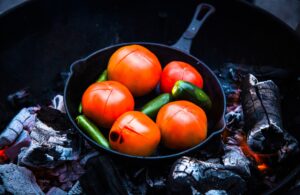Published 9 October 2022 ● Last Updated on 14 October 2022
Modern lifestyles, where we are short on time and high on multi-tasking, have pushed us to use newer materials and processes in our daily lives. While there is no getting away from the attraction of convenience, let’s take note of some valuable lifestyle choices that continue to be practical, relevant, and, most importantly, healthy even in these times.
Back to basics with cookware
Pots and pans serve a purpose more than simply holding your meal. The substance it is made of has the potential to leach into the food being cooked. Hence, the best and healthiest option for selecting cookware is to go back in time and pick those made of natural materials. This not only makes the food taste better but also has a host of health benefits. For instance, cooking in cast iron utensils help boost the iron content of food, particularly in acidic foods. Drinking water from copper has a one-of-a-kind ability to promote collagen in the diet. Brass is excellent in retaining water and hence improves human immunity.

Cooking in earthen pots is another great habit to embrace. It is a slower process and involves using a minimum amount of oil. Slow cooking allows moisture and heat to circulate through the food, retaining its nutritional level. Clay pots are alkaline in nature and interact with the food’s acidity, neutralising the pH balance and making it healthier. An added bonus is the earthy aroma and taste of the food cooked in a clay pot.
Water stored in earthen pots stays cool naturally and has many health benefits. Beyond being good for food, unglazed earthen pots are great for the environment as they are biodegradable.

But what about aluminum and nonstick cookware?
Aluminum is widely used across the world to cook or as foil, to store and carry food. Aluminum, however, is not the best medium for cooking as it tends to leach onto the food, resulting in its ingestion. This can result in serious health issues.
Nonstick cookware is omnipresent in most kitchens today because of its ease of use and being light. Non-stick cookware may seem like an appealing alternative to traditional cookware but are not safe for us for the earth.

Polytetrafluoroethylene (PTFE) , a thin clear plastic that’s coated on nonstick pots and pans, gives them a waxy, easy-to-clean surface. This plastic coating commonly known as Teflon begins to disintegrate when overheated and releases a host of toxic gases. Of particular concern is perfluorooctanoic acid (PFOA). Long-term exposure to PFOA is linked to a host of conditions from cancer to thyroid disease.
Slow down and be mindful of your pace and that of your eating and drinking
Most of us tend to rush through the day, not setting aside time to enjoy and savour the moments that get presented to us. This sets the stage for a stress-filled and usually detrimental-to-self lifestyle!
With food, we ‘grab a bite’ or ‘gobble it down and with water, we ‘gulp it down. All we need to do is reverse this habit of grabbing and gulping and slow down. A few minutes extra for each meal is all it would take.
Eating slower and chewing more has compelling personal benefits too – ranging from a fair chance at weight loss to the ability to enjoy what you are eating, to more respect towards your digestive tract, and most importantly less stress. This is what they call chewing your water and drinking your food. That is chewing your food well enough that it almost becomes watery before swallowing it and drinking your water slowly taking in its taste.
Once you have slowed down, weigh out the what, the when, and the how of eating

What? Abstinence from foods or drinks comes in many forms, including turning vegetarian, giving up liquor, not eating grains for a certain period, or eating between particular windows of time – intermittent fasting.
When? Though fasting has become a fad lately, it is in fact a practice steeped in tradition, dates back centuries, and plays a pivotal role in many cultures and religions the world over. Fasting regularly is seen to be beneficial to the body. Not only does it help in weight reduction but also promotes blood sugar control by reducing insulin resistance, improves gut health and absorption, fights inflammation, prevents neurodegenerative disorders, increases growth hormone secretion, aids in cancer prevention, and increases the effectiveness of chemotherapy.
How? Food should be consumed fresh for maximum taste and health benefits. Avoid reheating food. Ditch the microwave. Should you need to reheat, choose a stove top instead. Continually eating microwaved food causes irreversible damage to our bodies.
Increase fresh, seasonal, local produce in your diet
There was a time when, as the seasons changed throughout the year so did the available fresh produce. Slowly seasonality became redundant and all kinds of fruits and vegetables became available throughout the year.

Every fruit and vegetable require different temperatures, soil conditions, and sunlight to grow effectively – these change throughout the year, and hence fruits or vegetables mature and ripen across seasons.
Eating seasonal produce supports our body’s natural nutritional needs. For instance, in winter citrus fruits grow in abundance, these are particularly high in Vitamin C which is very important for preventing infections such as colds and flu which are common during the cold season. Summer foods such as stone fruit and watermelon are rich sources of water, they also provide us with extra beta-carotene and other carotenoids that help protect us against sun damage, and they also provide more sweetness for an energetic summer. Eating seasonal also has other benefits such as being cost-effective, and better tasting since they are fresh.
When choosing your fruits and vegetables look for freshly harvested or local produce so it hasn’t traveled far to your plate, this way you are saving the precious earth but keeping your carbon footprint low.
Famous last words
The food we eat and the water we drink does not merely fill the stomach or please the palette – but provide us with vital nutrients to keep each cell of the body functioning to its optimum. Let us make the right choices concerning our food and drink. When buying packaged food, remember to read the label- here is a handy guide on how to. Lastly, remember all the struggle in life is to be able to get a square meal, so be grateful and appreciate the food on your plate, and please do not waste it!
Related Links
Zero Waste Cleaning | Everyday items we use that cut the toxicity, the grime and the cost!



0 Comments